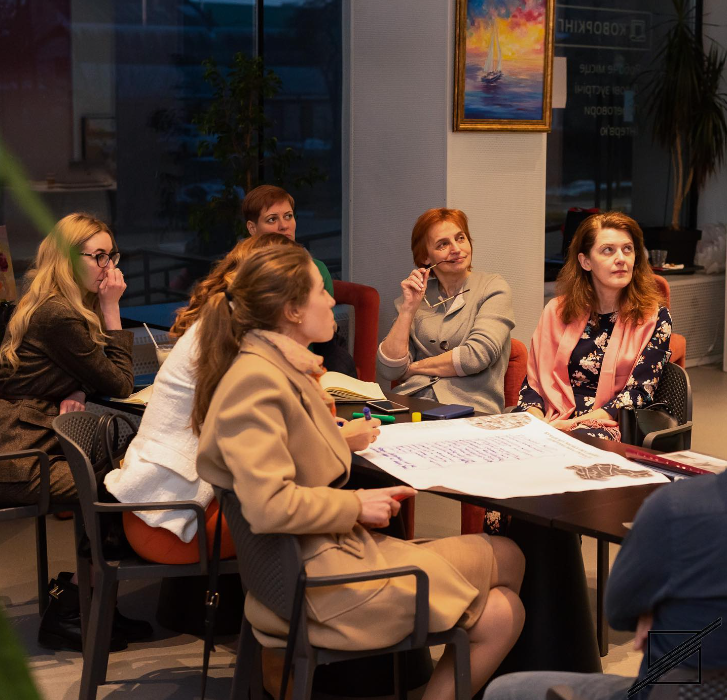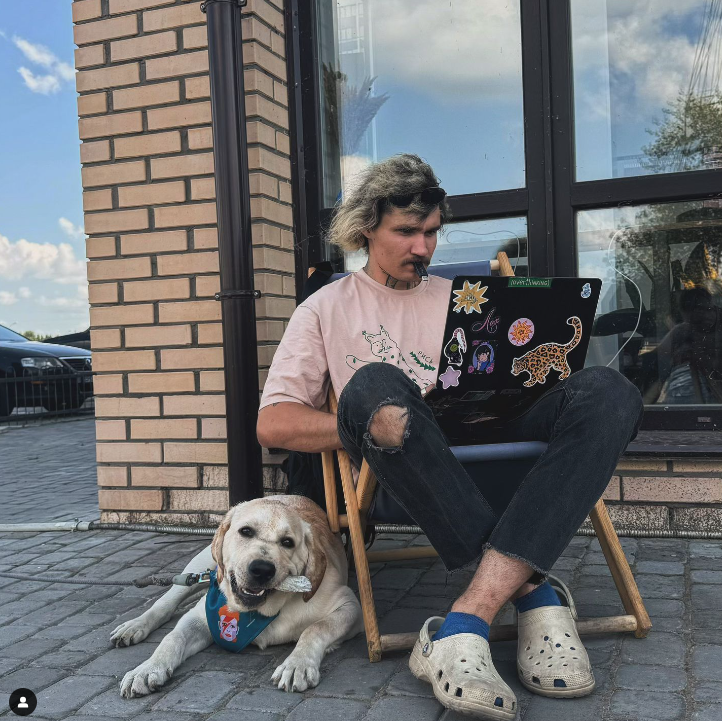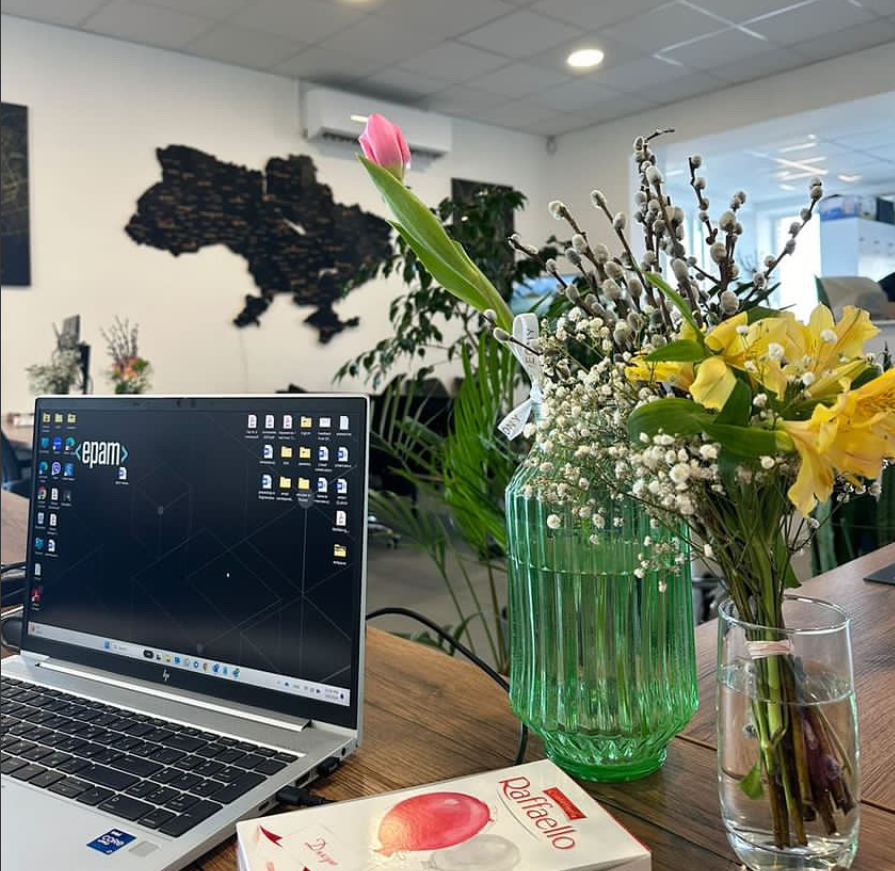Coworking spaces in Ukraine, which provide shared workplaces for independent professionals and teams, have undergone remarkable transformations to survive the disruptions caused by the ongoing war, a new study by researchers from the Prague University of Economics and Business finds.
Many of these collaborative work hubs were damaged or occupied when the conflict erupted in February 2022. One space in Bucha reported its complex was destroyed, with “broken windows and damaged equipment.” However, a good deal of them displayed resilience by adapting their operations and roles within communities.
The study examined 16 coworking spaces across Ukraine's regions through interviews and co-constructed narratives with managers between April 2022 and December 2022.
Before the war, around 100 coworking spaces operated in Ukraine, with 40% concentrated in Kyiv.
During the war, some coworking spaces converted their offices into temporary shelters for those displaced by the fighting. The study found one space that sheltered over a dozen displaced families and friends in Lviv. Others played vital roles as social support systems, providing humanitarian aid, legal assistance, psychological counselling, and child development programs, especially for displaced families.
"We are now more focused on improving the emotional health of our next generation so that children can forget about this horror, live everyday life, and rebuild Ukraine," a manager of a Kyiv coworking space told researchers.

Operationally, the spaces had to offer discounts, change membership rules, and automate processes as attendance and income dropped. One space in Kharkiv reported that attendance fell as "people chose to save money and stay at home" amid security and financial pressures—some employed displaced persons from conflict zones like Donetsk.
User behavior also shifted, with members preferring shorter subscriptions rather than long-term memberships because of uncertainties caused by the war.
"Before the war, residents often picked a workspace for at least a month. Today, many people do not clearly understand where they will be tomorrow," a Lviv coworking manager said.
The study highlights how coworking spaces facilitated local networking, collaborated with organizations, and held events aimed at the post-war rebuilding of communities. Researchers argue these spaces represent "microcosms of societal resilience" pivotal to recovery efforts.
From traditional work hubs, many Ukrainian coworking spaces transformed into "crucibles for community support" and drivers of social/economic contributions during the crisis, as the study's model depicts.
The name of Resilience is...
PORTAL HUB, Enerhetykiv 2, Bucha, Kyiv Oblast
The Bucha Coworking Portal Hub has been operating since 2018, weathering the COVID-19 pandemic, the Russian occupation, the harrowing aftermath, and the rehabilitation after the occupation. Through sheer determination and adaptability, the team that operates the hub kept the community alive, during the darkest days.
 "We thought about closing down; yes, we did," admits Natalya Levchenko, the portal's manager. "But we had to adapt to the situation that happened." In July 2022, the space was transformed into a volunteer headquarters, distributing humanitarian aid to the battered population. Rent was waived during this period, but the team quickly got to work, ordering a deep clean and repairing the damaged doors and windows.
"We thought about closing down; yes, we did," admits Natalya Levchenko, the portal's manager. "But we had to adapt to the situation that happened." In July 2022, the space was transformed into a volunteer headquarters, distributing humanitarian aid to the battered population. Rent was waived during this period, but the team quickly got to work, ordering a deep clean and repairing the damaged doors and windows.
By the end of the year, the portal had reopened, thanks to support from international donors who funded a yearlong program of activities and covered the rent and utilities. This allowed the team to diversify, opening a cosy coffee shop and a local souvenir shop featuring crafts made by internally displaced persons (IDPs).
"We have a lot of IDPs, and in fact, most of them lost their jobs and started doing some kind of craft," Natalya explains. “We sell their products in our souvenir shop. And we also have various confectionery products that they make in the coffee shop.”
The road to recovery has not been easy. Power outages and blackouts have posed a constant challenge, but the portal's backup generator and additional electrical line have kept it running.
The Bucha Coworking Portal has evolved into a true “third place”—a hub for community, culture, and connection, beyond just the home and workplace. Children attend extracurricular activities here, and the space hosts regular public organization meetings and cultural events.
"We try to diversify our activities as much as possible, using our ability to adapt to the situation to stay in that space," Natalya says. "We feel the value that we give to the population, especially to IDPs who need to assimilate in the city, look for new connections, and look for a new circle of friends for themselves and their children."
Now, the portal is taking another innovative step, partnering with a postal delivery service to become a package collection point, generating additional income and visibility.
In a city still recovering from the horrors of war, the hub is now a place where entrepreneurs, remote workers, and displaced residents alike can find support and tools to rebuild their lives beyond the usual function of a co-working space.
A new lifeline for creatives
O&D Hub, Dnipro Heroes St. 4/2, Cherkasy
The
O&D Hub, a bustling 95% occupied workspace, started after the Russian invasion and has since become a lifeline for professionals without a reliable place to work as power outages swept the region.

The hub's origins trace back to the owner's struggle to find a suitable workspace during the blackouts. "I have worked in logistics, and when the power outages started, there was nowhere to work, so I decided to open my own coworking space!" Dmytro Kurch recalls.
Since opening its doors, the O&D Hub has attracted a diverse crowd, catering to the needs of IT specialists, arbitrage experts, crypto enthusiasts, designers, and salespeople. These professionals often find themselves distracted by the realities of working from home—their pets, partners, and children—and seek out the community-oriented environment the hub provides.
The O&D Hub organizes regular events and evenings for its coworkers to foster this sense of community. These gatherings help maintain a warm and friendly atmosphere within the space, which the owner cites as the primary draw for their clients.
"A warm and friendly atmosphere and the staff's attitude towards the coworkers" is what Dmytro believes sets the O&D Hub apart in a crowded market.
Collaboration in the heart of the community
YADRO, 50B Hrushevsky Avenue, Kamianets-Podilskyi
"I cannot work at home," Ivan Kolisnyk admits. "At home, I practically think about household chores, not work." This sentiment was echoed by like-minded individuals who felt it was better to separate the workspace from the home, allowing for greater focus and productivity. So Ivan, founder of the Kamianets-Podilskyi
Yadro coworking space, set out to fulfil this need.

Inspired by global trends in office culture, the team behind the coworking space brought a touch of cosmopolitanism. "We looked at how people work in the world right now, what kind of offices they are making, and so we decided to organize a coworking space in our small city like Kamianets-Podilskyi."
While the space is designed to accommodate up to 12 comfortable workstations, there’s still a relatively low attendance, the founder notes. This is due to a mix of regular, subscription-based clients and more transient visitors—tourists and professionals—passing through the city, after the war.
"There are professionals with a subscription, who have been working for months," the founder explains. "And workers who visit our coworking space for a day, two days, or even an hour only."
While the founders initially expected the majority to be IT professionals, the reality has proven more eclectic. "Our clients include financial advisors, accountants, lawyers, and electricians. That is, different people work in our coworking space who find a common language and share a workspace with different professions."
This mix, the founder believes, is a natural fit for a small city like Kamianets-Podilskyi, where the space has become a hub for cross-pollination and collaboration. The founder emphasises the importance of community and convenience when asked about the key factors that draw clients to the space.
“A coworking space is not a workplace, the Internet, or a desk. It's a little something else." The ability to adapt to and be adopted by the community of coworkers is essential, alongside the practical considerations. "Desks and chairs should be comfortable. Cleanliness, microclimate, cool in summer, warm in winter. All the amenities—coffee and tea to drink. That's the plan for what it should be."
In a small city like Kamianets-Podilskyi, has become a communal heart for remote professionals, fostering connection, productivity, and a sense of belonging amidst the uncertainties of the modern work environment.
--
The interviews were conducted by Vika Zhurbas - The article was edited by Matthaios Tsimitakis
Images: Courtesy of the Portal Hub, O&D and YADRO










 "We thought about closing down; yes, we did," admits Natalya Levchenko, the portal's manager. "But we had to adapt to the situation that happened." In July 2022, the space was transformed into a volunteer headquarters, distributing humanitarian aid to the battered population. Rent was waived during this period, but the team quickly got to work, ordering a deep clean and repairing the damaged doors and windows.
"We thought about closing down; yes, we did," admits Natalya Levchenko, the portal's manager. "But we had to adapt to the situation that happened." In July 2022, the space was transformed into a volunteer headquarters, distributing humanitarian aid to the battered population. Rent was waived during this period, but the team quickly got to work, ordering a deep clean and repairing the damaged doors and windows. The hub's origins trace back to the owner's struggle to find a suitable workspace during the blackouts. "I have worked in logistics, and when the power outages started, there was nowhere to work, so I decided to open my own coworking space!" Dmytro Kurch recalls.
The hub's origins trace back to the owner's struggle to find a suitable workspace during the blackouts. "I have worked in logistics, and when the power outages started, there was nowhere to work, so I decided to open my own coworking space!" Dmytro Kurch recalls. Inspired by global trends in office culture, the team behind the coworking space brought a touch of cosmopolitanism. "We looked at how people work in the world right now, what kind of offices they are making, and so we decided to organize a coworking space in our small city like Kamianets-Podilskyi."
Inspired by global trends in office culture, the team behind the coworking space brought a touch of cosmopolitanism. "We looked at how people work in the world right now, what kind of offices they are making, and so we decided to organize a coworking space in our small city like Kamianets-Podilskyi."